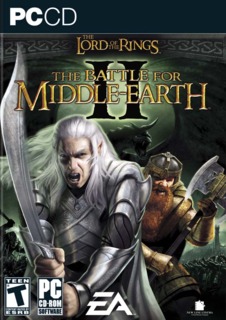Captures the atmosphere of Middle-Earth well. Above average as RTS games go.
Getting straight to the gameplay, BFME2 has 6 different factions to choose from, 3 of which are good, and 3 that are evil. I haven't spent equal time with each of them, but they all have their merits. Everyone gets footmen, archers, and catapults, Mordor and goblins get huge trolls, dwarves get battle wagons, men get horses and more defensive structures, and so on.
Units have rock/paper/scissors type weakness against certain types of units, like archers are strong against monsters, horsemen are strong against archers, pikemen are strong against horsemen. The unit type advantages are generally pretty significant, but not so much that a disadvantaged unit type does absolutely no damage. At the same time, BFME2 doesn't seem to require nearly as much micromanagement in battle as some other RTS games. This is largely due to the effective use of formations in the game. Horsemen and footmen tend to automatically form the front lines of your army, while archers bring up the rear and rain arrows down on their foes.
Effective management in battle can still make a big difference, however. Rather than waiting for horsemen to break through the enemies front line, you may choose to have a unit group swing around to the side and crash through enemy archers, for example. Additionally, you get special powers for your army that can be used peridically, similar to the General powers from C&C: Generals. Hero units also gain powers as their experience increases, much like in WarCraft III. Effective use of these powers can make a huge difference in how a battle goes.
The hero creation system in BFME2 is pretty cool. I agree with Gamespot's complaint that it's disappointing that you don't get many options regarding your hero's physical appearance, however you don't play the game zoomed in much anyway, and the main focus is the selection of hero abilities/powers.
Each hero type gets 10 points they can allocate into a selection list of about 15 different powers. Initially you can only spend your first two hero points on about 6 different powers, at which point you can spend your next 3 points in an additional 6 or so powers. Another set opens up at the 6th point, and there are some powers than can only be purchased with your 10th power point. You can only have a total of 6 different powers, though, so some of these points will need to be spent on upgraded versions of a power you already purchased.
Available hero powers vary depending on the hero class you choose, which determines what factions the hero can fight for. Powers range from wizard fireballs and lighting bolts to temporary x2 damage/armor bonuses for sword fighters. Some abilities are passive auras, similar to paladin auras in WarCraft. One of these increases the damage and armor of nearby friendly units by 50%, while also providing increases to earned experience. Overall, the powers can make a big difference and are pretty fun to use.
In the game, once you build/purchase your hero unit at the main base, he/she starts at level one. By killing enemy units for experience, the hero will slowly unlock the abilities you designed them with. When you start a game, you can choose one of your custom heroes to be available, limiting you to only a single customized hero in the actual game. However, you can still build additional LOTR heroes like Aragorn or Gandolf to fight alongside your custom hero.
In addition to skirmish mode and the single player campaigns, there is the War of the Ring mode. For the most part, this serves as a wrapper for the RTS battles. It doesn't really become a game by itself, the way Star Wars: Empire at War tries to, and instead keeps the focus the RTS game. That said, the units and structures you move around the world map make a big difference. If you bring a small army with you while the enemy has next to nothing, you can forgo building up a large town and instead rush the enemy before they can get any defenses up. Conversely, if you are being attacked in an area where you have a fortress built, you'll start with one when the game begins, providing a significant advantage depending on how you play.
As far as LOTR, BFME2 does a really good job of capturing the environment. All of the maps are based on familar areas, like Isengard, the Gap of Rohan, Mirkwood, etc. Likewise, watching a group of 20 horsemen crash into a battalion of archers brings back memories of the battles fought in the movies. The music is well chosen, and the sounds feel like they were pulled out the movie (and done so quite well). When you have heroes like Aragorn in your army, he will occasionally speak lines pulled from the movie. None of this feels overused, and the game is pretty smart about the context in which they are used.
Overall, I think BFME2 is a great game. It has some really solid gameplay, and doesn't feel as much a frantic click-fest as other games like WarCraft III, which tends to require lots of micromanagement. Instead, it's strategy that tends to make the difference, and that should really be the focus of an RTS game anyway. Everything just flows well.

